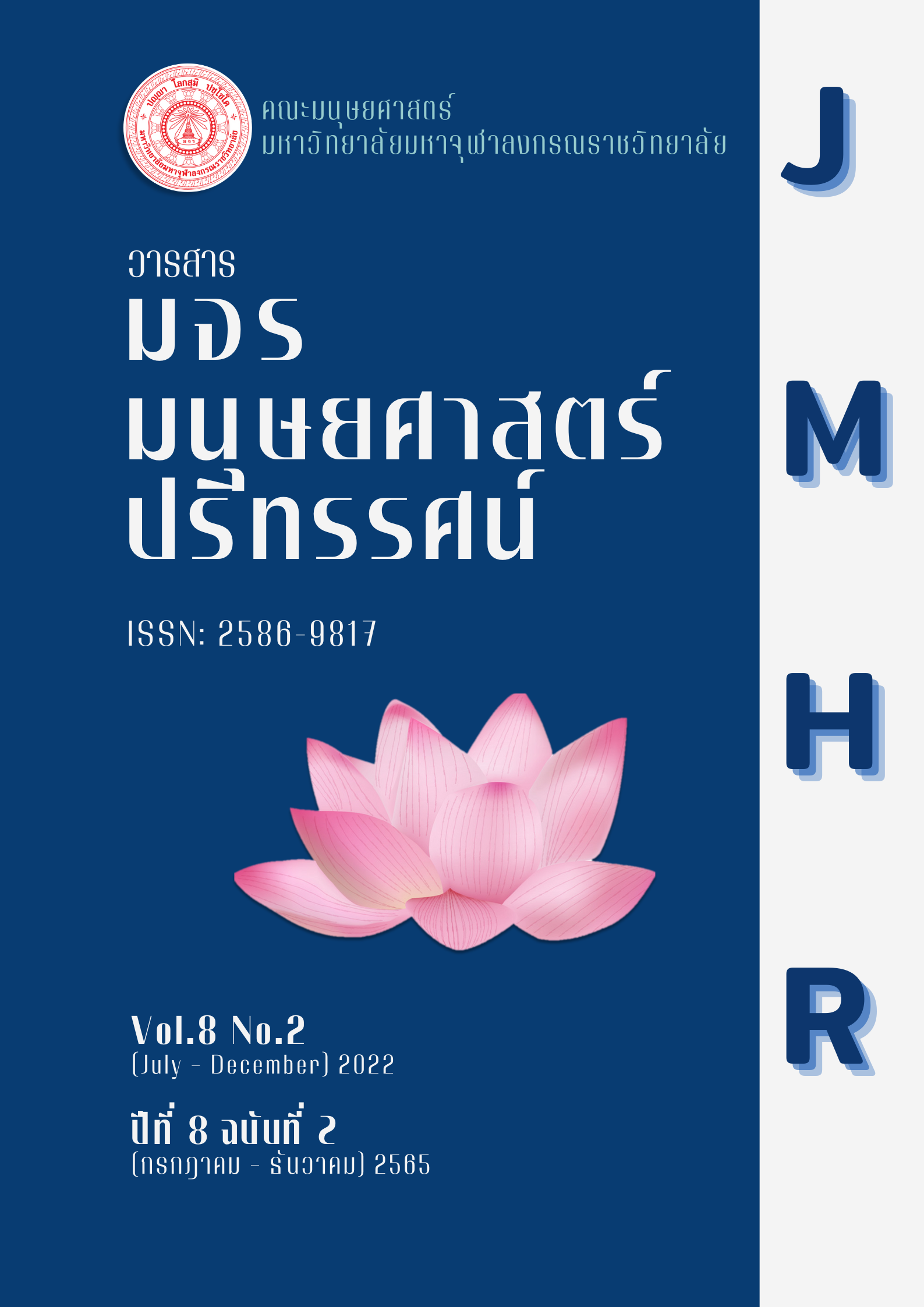คุณลักษณะผู้นำเชิงกลยุทธ์ตามแนวพุทธจิตวิทยาในองค์กรธุรกิจเครือข่าย
คำสำคัญ:
ผู้นำเชิงกลยุทธ์, พุทธจิตวิทยา, ธุรกิจเครือข่ายบทคัดย่อ
วัตถุประสงค์ของการวิจัยนี้เพื่อศึกษา คุณลักษณะผู้นำเชิงกลยุทธ์ตามแนวพุทธจิตวิทยาในองค์กรธุรกิจเครือข่าย รูปแบบงานวิจัยเป็นการวิจัยเชิงคุณภาพ (Qualitative Research) โดยการใช้เครื่องมือดำเนินการศึกษาวิเคราะห์จาก แนวคิด ทฤษฎี หลักพุทธธรรม เอกสาร งานวิจัยที่เกี่ยวข้อง และการสัมภาษณ์เชิงลึกด้วยแบบสัมภาษณ์แบบมีโครงสร้างที่สร้างขึ้น ตรวจสอบความถูกต้อง ความชัดเจนภาษาและความครบถ้วนเหมาะสมทางวิชาการผ่านอาจารย์ที่ปรึกษาแล้วนำเสนอ ผู้เชี่ยวชาญ 5 รูป/คน ในการประเมินค่าดัชนีความสอดคล้องกับวัตถุประสงค์การวิจัย และทุกข้อคำถามมีค่า IOC ที่ 0.8-1 ซึ่งถือเป็นข้อคำถามที่ได้นำมาใช้อย่างมีประสิทธิภาพทุกข้อคำถามเพื่อรวบรวมข้อมูลจากประชากรและกลุ่มตัวอย่างผู้ให้ข้อมูลสำคัญ (Key Informants) โดยเลือกแบบเฉพาะเจาะจง (Purposive Sampling) ประกอบด้วย ผู้ทรงคุณวุฒิด้านพระพุทธศาสนาและด้านพุทธจิตวิทยา จำนวน 3 รูป/คน ด้านจิตวิทยาและด้านพุทธจิตวิทยา จำนวน 3 รูป/คน ด้านผู้นำในองค์กรธุรกิจเครือข่าย จำนวน 14 คน รวมเป็น 20 รูป/คน
ผลการวิจัยพบว่า
- ผู้นำในองค์กรธุรกิจเครือข่ายได้นำหลักสังคหวัตถุ 4 ประกอบด้วย ทาน ปิยวาจา อัตถจริยา สมานัตตตา และ หลักอิทธิบาท 4 ประกอบด้วย ฉันทะ วิริยะ จิตตะ วิมังสา เป็นองค์ธรรมรวมของคุณลักษณะผู้นำเชิงกลยุทธ์ต้นแบบใช้เป็นกลยุทธ์ในการบริหารคนและบริหารงานในองค์กรธุรกิจเครือข่าย เพื่อให้บรรลุความสำเร็จผลประโยชน์ทางรางวัลตามแผนธุรกิจและสามารถตอบโจทย์ชีวิต ตามทฤษฎีลำดับความต้องการพื้นฐานชีวิต 5 ขั้นของมาสโลว์ (Maslow's Hierarchy of Needs) และผู้นำในองค์กรธุรกิจเครือข่ายดำเนินธุรกิจด้วยการนำแนวคิดเชิงกลยุทธ์ และทฤษฎีพฤติกรรมนิยม ด้านการสร้างแรงจูงใจ ด้านวิสัยทัศน์ ด้านทักษะการเรียนรู้ ด้านการสื่อสาร เป็นกลยุทธ์ร่วมในการสร้างคุณลักษณะผู้นำเชิงกลยุทธ์ต้นแบบเพื่อบริหารบุคคลในองค์กรให้บริหารงานบรรลุเป้าหมาย
- คุณลักษณะผู้นำเชิงกลยุทธ์ตามแนวพุทธจิตวิทยาในองค์กรธุรกิจเครือข่ายมีคุณลักษณะผู้นำที่มีความพร้อม (2.1) ด้านบุคลิกภาพ ทั้งกายและใจมีหลักธรรมนำชีวิตและธุรกิจ (2.2) ความสามารถ เป็นบุคคลที่มีคุณธรรม จริยธรรม ปัญญาและมีวิสัยทัศน์ บริหารจัดการองค์กรด้วยกลยุทธ์การสื่อสารที่มีประสิทธิภาพ (2.3) ทักษะทางสังคม เป็นคนมีมนุษยสัมพันธ์ เป็นบุคคลที่มีความสามารถในการร่วมทีมเพื่อเข้าร่วมในกิจกรรมที่ส่งเสริมความสำเร็จขององค์กร
เอกสารอ้างอิง
พระพรหมคุณาภรณ์ (ป.อ. ปยุตฺโต). (2552). พุทธธรรม ฉบับปรับปรุงและขยายความ (พิมพ์ครั้งที่ 11). กรุงเทพฯ : โรงพิมพ์มหาจุฬาลงกรณ์ราชวิทยาลัย.
พระครูประภัศร์ธรรมาภิรักษ์ (จันเขียด). (2561). ศึกษาการบริหารสถานศึกษาตามหลักสังคหวัตถุ 4 ในสถานศึกษาขั้นพื้นฐานสังกัดสานักงานเขตพื้นที่การศึกษาประถมศึกษาชัยภูมิ (วิทยานิพนธ์พุทธศาสตรมหาบัณฑิต). มหาวิทยาลัยมหาจุฬาลงกรณราชวิทยาลัย : พระนครศรีอยุธยา.
พระมหาบรรจง ติสรโณ (ศรีสุข). (2560). ศึกษาการประยุกต์ใช้หลักอิทธิบาทธรรม 4 ในการจัดการเรียนการสอนของโรงเรียนปริยัติคุณรสวิทยา อำเภอเมืองสุรินทร์ จังหวัดสุรินทร์ของสถานศึกษาเพื่อให้บุคลากรปฏิบัติงานอย่างเป็นระบบ (วิทยานิพนธ์พุทธศาสตรมหาบัณฑิต). มหาวิทยาลัยมหาจุฬาลงกรณราชวิทยาลัย : พระนครศรีอยุธยา.
มหาจุฬาลงกรณราชวิทยาลัย. (2539). พระไตรปิฎกภาษาไทย ฉบับมหาจุฬาลงกรณราชวิทยาลัย. กรุงเทพฯ : โรงพิมพ์มหาจุฬาลงกรณราชวิทยาลัย.
Betty Smith Williams. (2005). A Lesson in Strategic Leadership for Service. Nurse Leader.

ดาวน์โหลด
เผยแพร่แล้ว
รูปแบบการอ้างอิง
ฉบับ
ประเภทบทความ
หมวดหมู่
สัญญาอนุญาต
ลิขสิทธิ์ (c) 2022 วารสาร มจร มนุษยศาสตร์ปริทรรศน์

อนุญาตภายใต้เงื่อนไข Creative Commons Attribution-NonCommercial-NoDerivatives 4.0 International License.





